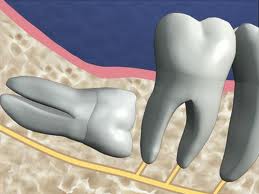 Of all of the teeth in the mouth, the wisdom teeth are the most likely to become impacted, or trapped in the bone or gum tissue. The wisdom teeth, also known as the third molars, are the largest teeth in the mouth, and the jaws of modern humans often are too small to accommodate them.
Of all of the teeth in the mouth, the wisdom teeth are the most likely to become impacted, or trapped in the bone or gum tissue. The wisdom teeth, also known as the third molars, are the largest teeth in the mouth, and the jaws of modern humans often are too small to accommodate them.
When the wisdom teeth fail to erupt properly, a number of problems can result. Impacted wisdom teeth are more prone to infection than other teeth, and they can develop abscesses and tumors. Impacted third molars also can be very uncomfortable.
Even if the wisdom teeth do erupt, they can crowd the other teeth, rendering years of orthodontic treatment totally useless. Wisdom teeth can also damage neighboring teeth and make them more susceptible to decay.
To avoid these problems, patients should have their wisdom teeth extracted by an oral surgeon by age 25. Younger patients face the lowest likelihood of complications from the procedure and they heal more quickly afterward, as well.
Patients may not even need to wait until their later teen years to begin planning for extraction. X-rays can help an oral surgeon determine the likelihood of impacted or otherwise problematic wisdom teeth in patients as young as 12 years old. Having this knowledge is very useful in deciding on the timing of extraction.
Wisdom tooth extraction is a routine procedure at this point, and oral surgeons perform them on a regular basis. It is completed in the office, and nearly all patients choose some form of sedation in addition to local anesthetic for maximum comfort. Your oral surgeon will also make recommendations for surgery preparations and aftercare at home to help limit the possibility of complications from the procedure.
Patients who have asymptomatic wisdom teeth may still want to consider extraction as a preventive measure. You never know when problems will arise due to impacted third molars. Contact Northern Texas Facial & Oral Surgery, serving Dallas Texas and the surrounding areas, to learn more about your options.

